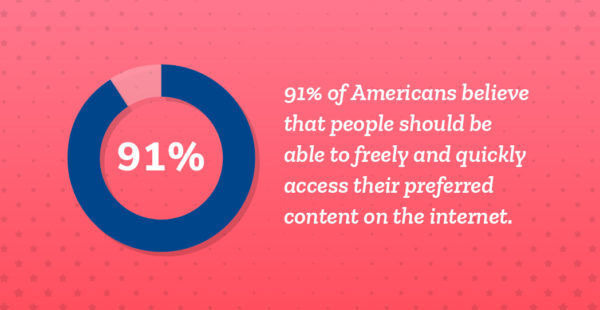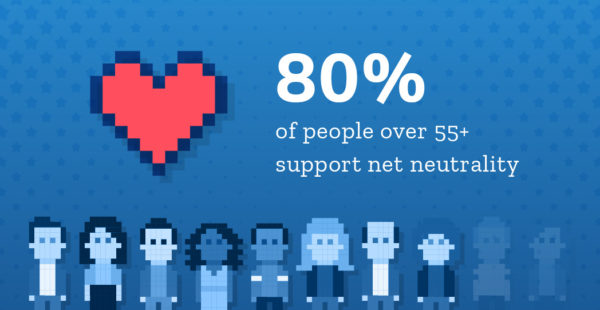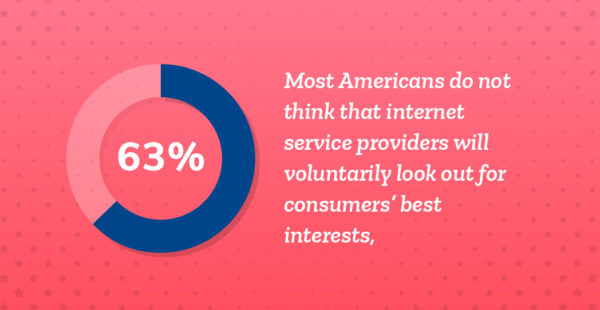“Today marks the ostensible effective date for the FCC’s net neutrality repeal order, but it does not mark the end of net neutrality,” says Denelle Dixon, Mozilla COO. “And not just because some procedural steps remain before the official overturning of the rules — but because Mozilla and other supporters of net neutrality are fighting to protect it in the courts and in Congress.”
Also today: Mozilla is publishing results from a nationwide poll that reveals where Americans stand on the issue. Our survey reinforces what grassroots action has already demonstrated: The repeal contradicts most Americans’ wishes. The nation wants strong net neutrality rules.
“The new Mozilla and Ipsos poll shows once again that Americans across the political spectrum overwhelmingly want strong net neutrality protections, and that they don’t trust their ISPs to provide it for them without oversight,” says Gigi Sohn, Mozilla Fellow and former FCC counselor.
“What should make policymakers stand up and take notice is that 78% of Americans, including 84% of adults under the age of 35, believe that equal access to the internet is a right, and not a luxury,” Sohn continues.
~
Mozilla and Ipsos conducted this public opinion poll in February of 2018, surveying 1,007 American adults from across 50 states. Among our key findings:
Outside of Washington, D.C., net neutrality isn’t a partisan issue. Americans from red and blue states alike agree that equal access to the internet is a right, including: 79% of Colorado residents, 81% of Arizona residents, and 80% of North Carolina residents.
91% of Americans believe consumers should be able to freely and quickly access their preferred content on the internet. Support for net neutrality is growing: When Mozilla and Ipsos asked this same question in 2017, 86% of Americans believed this.

78% of Americans believe equal access to the internet is a right. This opinion is most common among younger Americans (84% of adults under the age of 35).
76% of Americans believe internet service providers (ISPs) should treat all consumer data the same, and not speed up or slow down specific content. This opinion is most common among older Americans (80% of adults ages 55+) and Americans with a college degree (81%).

63% of Americans do not think that ISPs will voluntarily look out for consumers’ best interests, compared to 32% who agree with this statement. Faith in ISPs is declining: When Mozilla and Ipsos asked this same question in 2017, 37% of Americans trusted ISPs.

See the full results from our poll here. See results from the 2017 Mozilla/Ipsos net neutrality poll here.
~
What’s ahead?
“Today could be the start of a shift away from freedom and innovation,” adds Denelle Dixon. “Some opponents of net neutrality will say our concerns are misplaced, and that when April 24 fails to see a wave of blocking, throttling, and fast lanes, that they were right in their claims. But that’s not how the world without net neutrality will develop. The impact won’t be immediate, like a lightswitch. Instead, we’ll see more of a gradual chipping away — an erosion into a discriminatory internet, with ultimately a far worse experience for any users and businesses who don’t pay more for special treatment.”
“There is an active lawsuit on this matter in the case titled ‘Mozilla v. FCC’ — and today is also the last day that others can file additional challenges against the FCC, following Mozilla’s lead,” Dixon concludes. “We’ve been encouraged by the support we’ve seen with allies filing suit in the industry, and we hope to see more organizations joining us in the fight to protect net neutrality.”
At some point in the coming months, the Senate will likely vote whether to undo the FCC’s repeal of net neutrality. Per the Congressional Review Act, lawmakers can veto the FCC’s decision with a majority vote. If the Congressional Review Act resolution passes the Senate, it will move to the House, then (maybe) the president’s desk. (Learn more about the Congressional Review Act and net neutrality here.)
“Members of Congress can restore net neutrality protections right now by passing the Joint Resolution of Disapproval that has been introduced in both houses,” Gigi Sohn says. “Voters will make their displeasure known to anyone who doesn’t support this measure in November.”
In the meantime, Mozilla will continue its fierce advocacy for a free, open internet. Earlier this year, we sued the FCC for its decision to gut net neutrality. And right now, we’re running a campaign that makes calling your elected official easy. Visit https://advocacy.mozilla.org/en-US/net-neutrality/, pick up the phone, and urge your representative to save net neutrality.

























